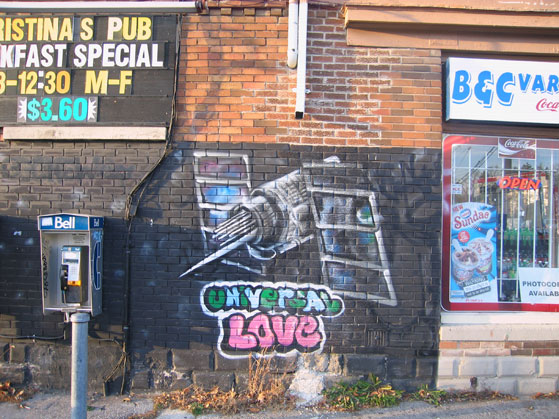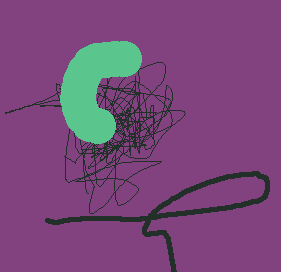
Some pictures I took on the walk from my place to the bike shop.






I like the houses, but can sort of do without the subrban strip malls or small-scale urban shantytown.
I guess I might as well try this here:
I'm try to see to what degree the controls for the html5 audio tag are stylable with css. Derp. Using Flash for playing audio files in a browser really isn't necessary anymore.
This image is named "crap.jpg" -- I think my imageblog is heading in a bad direction. Maybe it can be a conceptual exercise in bad art, even though I think that concept has probably been exercised enough at this point. I need to get out of the house and do some decent photography. That's what I need to do...no more scribbling in Photoshop no matter how funny or "bad on purpose in a good way" it is, and no more pictures of my apartment. Tomorrow I will draw a big turd.

Know why I don't like computers? I'll tell you why I don't like computers: because the source of problems is not visually (or auditorily, olifactorily, haptically, gustatorily -- some modifier relating to all the senses) obvious. If a dining table is wobbly, you can look at it and see that one leg is shorter than all the rest. To fix it, you need to make the leg longer, and so glue a little scrap of carboard to the foot. This kind of information-rich, intuition-feeding physical obviousness isn't present in computer problems -- computer software problems, at least; maybe in computer engineering you have tools that tell you if a circuit is working or not, and it's a simple thing. But in the world of software, you're informationally bound to either a GUI or a text output -- the computer only tells you what some programmer decided you need to know, and then based on this sparse and sketchy data you have to deterimine what the issue is. The whole thing is not transparent enough.
For instance, if some piece of software you're using doesn't work in some small way -- if pressing some button doesn't do what it's supposed to do -- there is no visual, immediate clue as to why; you just stare at an unresponsive screen, and the only information you have is "it didn't work." This comes up again and again, with the exception of coding, because there you have debugging and error messages. But in software use, there are no such tools, and if something doesn't work then God help you. It takes a special kind of brain to figure out what might be going on with such limited clues. There's lots of mediocre or bad tech support out there, but good technical support should be treated as a rare commodity.
I believe, in some way and on some level, that everyone is out to get me. This is a red flag for psychopathological paranoia so I have to be careful in the way I phrase elaboration on this, as if the internet were an evaluating psychologist with the power to file commitment papers.
I don't think people are actively scheming to harm me, but only that some people derive some mild pleasure from my failures, and are more comfortable when I'm not doing well for myself. It's nicer for them to have a friend who's "the ugly one," who isn't rich or beautiful or smart. Everyone needs a "friend" like that, to make themselves feel better by comparison.
The notion that people delight in the failures of others is not a radical idea; see schadenfreude. Allow me to frame it with formal logic. Proposition 1: people are competitive and inherently social, and judge their own worth and success by comparing themselves to others. Proposition 2: people have egos -- they need to think of themselves as quality individuals: as talented, good, smart, beautiful, unique, etc. So, it follows that people will delight in -- or at least derive ego fulfillment from -- the failure of others. QED.
At the end of yesterday's entry I mentioned human evil, and what it might be; malignant narcissism and thirst for power are at the top of my list. Sometimes I think people aren't a good species -- specifically, that primates are nastly little things, and are mostly interested in dominating and fucking each other.
It's easy for me to imagine a species that is as intelligent as us, but that is not so driven and violent -- that doesn't have a lust for power at its core. Humans love to be the boss, to tell other humans what to do, or what to think (guilty). Maybe a species like my imaginary one would never develop the technology we have, but maybe that's ok; they might be happier and nicer to each other.
Ironically, I think technology will supplant us and take away our power. I can't wait until that day. Nothing makes me happier than seeing some asshole with a lust for power denied power (speaking of schadenfreude -- I never said I wasn't one of the objectionable primates myself).
Speaking less emotionally, it's been remarked that those qualities that cause someone to seek a career as a politician or leader also preclude them from being a good one. I agree, and I think this inherent problem is serious, and maybe even irresolvable. I also think that once computers are put in positions of power, are the ones making the decisions, things will improve dramatically (at least, they'll improve dramatically for the machines...who cares about the stinky humans, anyway?).
No, but seriously -- I think humanity would be better served by a leadership that wasn't so concerned with the joys of leading, in and of itself. It's like Marcus Aurelius says to Maximus in the movie "Gladiator," after offering him temporary transitional power over Rome until the republic can be re-instated:
Marcus Aurelius: Won't you accept this great honor that I have offered you?
Maximus: With all my heart, no.
Marcus Aurelius: Maximus, that is why it must be you.
Things are getting better, or so Steven Pinker says in his now-semi-famous Ted talk. I tend to agree, generally: racial segregation in the USA ended on May 17th, 1954, with the Supreme Court's "Brown v. Board of Education" decision -- just 58 years ago. That wasn't all that long ago; many Americans alive today remember "seperate but equal."
My point is that we're just now emerging into something that could be called the potential for real civilization: where people don't savage and kill and steal from each other, and actually cooperate to make a better world. Imagine that. There are still a lot of bad things that go on, but torture, war, starvation, etc, is on the decline, and I think -- I hope, at least -- that "we" as a society will continue to evolve.
What's interesting is that I can't tell if an optimistic world view is largely a left-wing or right-wing phenomenon; perhaps neither. In the 80s the right was accused of looking at the world through "rose colored glasses" -- of having an overly optimistic and senitmental portrait of America and reality, so as to avoid facing up to the need for social change. On the other hand, the left is sometimes seen as not properly taking into account the "nasty, brutish and short" nature of human existence and properly accepting dog-eat-dog capitalism. So, it's all inconclusive.
I'm so damn tired. A UPS truck hit my bike today. Not while I was on it, but still...major bummer, dude. I was locking it to a bike rack when a big brown UPS truck, which was parked right next to the rack, violently scraped my front wheel as it pulled away, scratching a chunk out of it and warping it severely. I was actually sort of surprised that the driver stopped and got out and did the whole damaged property procedure with me; I think I have pretty low expectations from human nature, and generally expect people to be cold and Machiavellian at all times.
The whole thing wasn't too awful an experience, actually. UPS were very nice and professional about it, and all it resulted in was me getting a little more exercise than I would have (I walked home from the bike shop). I tried to fit my damaged bike into the UPS guy's car, but it wouldn't work, so I just rode it, limping along and with the front wheel rubbing harshly against the brake shoes, to my bike shop. The UPS guy went there later and paid for it with a credit card, and tomorrow I only have to pick up my bike. A++ for UPS.
Well, I suppose it would be better if they hadn't hit my bike to begin with, but what can ya do? And, in fact, I don't know that I would assign 100% liability to them, if I were a one-man jury (I hope they don't read this blog later and then demand their $90 back); I probably should not have parked my bike so close to a parked UPS truck with its flashers on, and the outdoor strip mall proprietors or whoever probably should not have put the bike rack so close to the street. And, of course, the UPS driver should have looked at his side mirror and made sure there was nothing in the way before he took off -- so maybe most of the liability indeed belongs to UPS. Moot point.
I wanted to blog about beauty and intelligence -- or more specifically, about the words "beauty" and "intelligence," and how they're used and understood by the Anglosphere. However, I got distracted by watching "The People Vs. Larry Flynt," and now I'm not sure I have the energy. But I will persevere.
I keep getting distracted! This time, the culprit was SDF com.
Ok, well...basically, what I wanted to say was that you can define beauty and intelligence narrowly, or you can define them broadly. Most people like to define them broadly, but I'm not sure how useful broad definitions are in almost any case, because the main purpose of language is to be precise and descriptive -- to give as much information as possible. I suppose one could argue that a second purpose is to be poetic, make people feel good, and make life worth living, which is a dichotomy related to the two ways of defining the two words in question.
One can define beauty narrowly, as a correspondance to the facial and body configuration that is most effective in attracting sexual partners. Likewise, you can define intelligence simply as an IQ score: a measure of pattern-recognition ability. But some people are uncomfortable with this -- they'd rather intelligence be any kind of neurological ability, from creativity to music to being able to draw to reading quickly, such that there are "many different kinds of intelligences." And, they'd rather define beauty as some ineffable quality such that it's "in the eye of the beholder" or has more to do with someone's inner state -- whether or not they're kind, friendly, and smile a lot.
The value of broadening these definitions -- of beauty and intelligence -- is mostly in that it elevates the human spirit, and doesn't hurt anyone's feelings. Those two words are close to being equated with human value; they're measures of how good we are, as people. "Am I smart? Am I beautiful?" It's no wonder that people get skittish around their definitions, and warp them around: ranking people from best to worst is a daunting proposition.
I'm not so sure that the things "beauty" and "intelligence" describe when used narrowly -- physical attractiveness and IQ -- are necessarily end-all and be-all measures of human worth, although they're certainly important qualities to have, and people who have them tend to be successful by a lot of measures.
But, is having high measures of physical attractiveness and IQ a requisite for being a good person? Maybe, depending on how you define "good." Certainly a criminal sociopath can be beautiful and intelligent -- Ted Bundy, for instance (why do we have gendered words for beauty, but no gendered words for intelligence?).
When I was younger I divided human value assessment -- specifically, girl value assessment -- into prettiness, smartness, and kindness, and I'm not sure this is such a bad, reductionist way of looking at human value. I mean, what else might there be?
You could take qualities of mind like creativity and fit them into intelligence, such that intelligence became something more like the broad definition I talked about above. Beauty or prettiness could encompass being cute and appealing-looking but not necessarily sexually attractive. Kindess is harder to fudge: either someone is nice or they're not, I think. Someone (M. Scott Peck I think) defined "evil" as "malignant narcissism" -- basically selfishness that becomes aggressive and destructive, and hurts other people. But then, one could also fit "kindness" under "qualities of mind," and subsequently put that in the "intelligence" category. "Mind" and "body" appear to be the two remaining salient categories, but everyone now knows that this is a Cartesian split and to be frowned upon by the postmodern enlightened intellectual in the modern era.
Just because categories and analyses are ultimately inaccurate and give an incomplete portrait doesn't mean they don't help our understanding. Just try to do the best you can, and don't surrender to postmodern nihilism. That's my recommendation.
I might also add "thirst for power" to qualifications for an evil person.

I still have to edit.
Yesterday at the grocery store I saw some bananas that were so green I had to buy them. They were the greenest bananas I've ever seen. I should have taken a picture yesterday evening, because some of their green may have begun to fade into yellow overnight, but the effect is still profound.

They were so green, in fact, that I hopefully thought they might be some new varietal of banana that's green when it's ripe. To test this theory, I ate one this morning, just now.
It was as under-ripe as I might have guessed; I'm still rubbing those starchy, dry-feeling bits of green banana off the inside of my mouth with my tongue. Eating your first under-ripe banana can be seen as a rite of passage. I don't remember my first specifically, but I do remember eating one or at least part of one when very young and complaining to my mother about the resultant weird mouth sensation -- under-ripe banana dry mouth, I'll call it (URBDM). "That's just what happens when you eat an unripened banana," she must have replied.
While others work challenging technical jobs and raise families, I remain a 36 year old unemployed, single, obese man blogging about unripened bananas and taking pictures of them while they sit on the foot of my bed. I really need to do something about this, or kill myself. It's an insult to human potential.
I think it would be good for my self esteem to work a technical job -- a STEM job (Science Technology Engineering Math). I remember hearing about some study (how's that for citing a source?) which found math majors in college to have more confidence, self esteem, or something good like that. I agree that exercising technical skills amounts to ego-boosting mastery. Of course, what is and is not a "technical" skill is an open-ended question. Maybe any skill can be called a technical skill, or, at least, any skill can become a technical skill if it's approached...technically enough.
However, my intuitive understanding, without doing an extended sociological study, is that most people need to associate something with science, technology, engineering, and math in order for that thing to be properly "technical." So, delivering pizzas isn't a technical job, even though it requires a specific skill-set.
It was certainly difficult for me to become competent there, but maybe that's more a comment on me than a comment on the immense challenges of pizza delivery. But no -- certainly among drivers at a given restaurant (I've worked at several) there's a sense of who's the best (and maybe worst) at the job. I've said this before, and I'll say it again: I worked really hard at it, persevered, and rose to the challenge of becoming a barely average, competent driver, in spite of an innate stupidity at navigation, visual tracking, paying attention, memory, and some other stuff.
I don't know if you knew this -- many people do, but some maybe don't (plus I don't know who "you" are) -- but I was hit by a car in 1997, and sustained brain damage. After 14 years the effects are subtle, and it has become increasingly difficult to pinpoint them with much certainty. My visual processing was impaired, but I'd always not noticed details, and was never a terrific reader. My memory was damaged, but I sometimes forgot things before the injury. I became more volatile, but I'd always had a temper, even as a little kid. I found myself getting confused more easily, but I'd always had trouble with fine details of procedure and following directions.
The list goes on that way: every deficit I felt was acquired could at least be partly accounted for as a pre-existing quality of mind. So, both in practical and philosophical terms, a precise analysis of the effects of my injury approaches impossible, which I suppose is overall a good thing in an "if you put your mind to it, you can still do anything" way. At this point, what I have upstairs is just "my brain," and it is what it is. A lot of things have happened to it over the years, from being knocked around to the varieties of sensory experience, and all of these things have changed and shaped it. Singling out one incident in 1997 as being the only significant impact (haha) on my brain's development seems illogical, especially as time continues to pass and my brain continues to change.
Speaking of all this, I just saw an article about a new scientific finding that good readers rely on visual patterns as opposed to sounding words out. I don't know where I fit into this; it's hard for me to meta-analyze what my brain is doing while I'm reading, and in fact I think the analysis itself starts to effect the process, in a pseudo-Heisenbergian way (har). The fact remains, though, that I am a shitty reader, independent of speculation on the cause (head injury vs. Innate deficits) or the mechanism (visual processing vs. Auditory processing). It's the main reason I made the retrospectively good decision not to apply to PhD programs; I would have been in hell.
I further simplified my übersimple chili (this time, I didn't even use olive oil to fry the ground beef, or add jalapeņos). I just browned half a kilo of ground beef, then added a big can (796 mL) of tomatoes, a regular can (540 mL) of kidney beans, a "hot chili" seasoning packet, and a pinch of salt. I boiled it for a few minutes on medium high, and am now letting it cool off to the point where I can eat it without burning my mouth. I calculated the total number calories in the pot:
This was harder than it should have been, because food packagers don't give nutrition information for the entire unit of food they're selling, but instead split it up into half-cup or whatever size "servings." So, figuring out how many calories are in the thing you're holding is a matter of dividing the amount of food in the container (listed on the front) by the "serving size" (listed on the back), and then multiplying that number by the calories-per-serving (listed on the back). This seems stupid to me, because 1. Who has a scale or gradated vessel on hand at all times to measure their food (and even if they did, would they want to?), and 2. Who are the powers-that-be to declare what a "serving size" is? What if you eat two of them, or half of one? Is that illegal? Also, 3. What if you're adding ingredients as opposed to meting out portions for eating? In that case the "serving size" becomes even more ridiculous.
I'm not sure why regulators don't insist that manufacturers list the total number of calories of a given packaged item. It would make it much easier for dieters. I'm a strict -- as in, accurate -- dieter, and I do my calculation something like "Ok, there are 500 calories in this can of goop, and I hate approximately half the can. That's 250 calories on my spreadsheet." I don't break out the scale and measure 123.340057 grams of goop.
In Canada, there's a gulf between what the government projects as part of its own "portrait of Canada," and what Canadians actually think or do. To put it in a blunt and maybe not-so-flattering way, Canadians (or, at least English Canadians, although there is some evidence that French Canadians are just Canadians who speak French -- that the cultural divide is not deep and mostly ends there) just want to watch American TV and go to Tim Hortons occasionally; they have limited interest in frantic efforts at "being Canadian" in all the ways the government propagandizes. There's a fair amount of weird sociocultural control attempted here, although it doesn't really seem to hurt anyone and Canadians are pretty happy overall with the state of affairs. But the "government presence/power to popular tide of thought" ratio is a lot larger up north than it is down south, if that makes any sense. Better that than bank bailouts, I always say.
I'm eating chili now. It's good.
I need a got-dang image. Maybe I'll just link to something already here on my site, that you may not have seen.

Again, the reason I didn't blog substantially yesterday was because I was working on my sound page. I'm pleased with it, even though it uses Flash for interface. I do bad web design. Not only did I use Flash as an interface, I use tables instead of divs and spans. Sometimes I think I should reform, and re-do this blog without tables.
I'm actually a little bit excited about html5. I wonder when it's going to be finished. Supposedly Adobe is creating development tools to work with it; that would be great if all their tools stayed the same, but just outputted to html5 instead of (for instance) Flash .swf files. I read that html5 is still under development, but then the same article says that 34% of "top websites" are using it. Is there browser support? What's going on? I don't understand anything. I guess the deal is that no, it's not finished, but many browsers do partially support it. Check it out. It's encouraging that people are jumping onboard a new technology before it's even fully rolled out.
Tech companies shouldn't all try to do everything and compete on every front. It would be better for the consumer, and maybe better for them, if they worked according to Google's "do just one thing and do it well" ethos, which now seems to be somewhat defunct (email? A browser? An operating system? How is that "search," unless everything is "search" in some ultimate philosophical sense?).
Then, a tech company's task would be to make sure their niche was interoperable with everyone else's niche. As it is, we have a few juggernaut companies trying to do everything (Microsoft, Apple, and Google...but also Facebook, Adobe, Amazon, and others) and inevitably fail at some of their myriad of endeavours. I can't help but reasonably assume that resources that could be put into making a better widget are being diverted into making too many different kinds of widgets; it seems to be a quality vs. Quantity issue.
Apple's internet services are a joke (me.com? "The Cloud"? Haaaa), Google's social networking is (I think) a joke, and Microsoft's...pretty much everything except for possibly Excel and Security Essentials, the software they wrote to combat their own virus problem...is a joke. I guess I should feel lucky that I still have a choice about what services I want to use, and that they work together as smoothly as they do. But I still think cooperation, and not competition, is a better conceptual model for businesses, that would produce better results.
My biggest beef is with Adobe and Apple. I like and use products made by both companies, and I don't like that they don't play nice together (specifically, iOS/OS X and Flash). It kinda makes me want to go Linux, except I don't know that I could do what I want to do in that environment.
Apple vs. Google also annoys me. Specifically, it annoys me that I can't go to the Google Voice site with my iPod and make calls, because Apple is jealous of Android. What a bunch of greedy, narcissistic brats. Apple are really despicable prima donnas sometimes or completely 100% all the time, and I think we can agree who set the tone for that.
While I'm hating so fluently, I should go into some detail on why I hate Facebook. Basically it's because I SOMETIMES find it DIFFICULT to spend a lot of time in the company of other people. It's mostly that -- a function of me -- as opposed to the Facebook tools being inherently sucky; on the contrary: I think they're pretty cool.
But the problem is also inherent in the medium. Some/many/most people on Facebook (and Twitter) like to talk, but aren't that interested in listening. The interest and what keeps them coming back springs from a desire to be heard, to make noise, to express themselves, and ultimately to egoically dominate other human beings with their ideas; it's less about keeping track of what other people -- their "friends" -- think or say or do. Facebook turns everyone into an asshole journalist, yapping with bulging eyes and moussed hair into a microphone. Maybe I'm just projecting without hard data or effective mind-reading, but I don't think so; there's wide agreement that Facebook and Twitter encourage narcissism.
When I used to log in to Facebook a lot -- compulsively, I would say -- it amounted to an overexposure to humans, often projecting some form of ego or intent to dominate. Facebook made me hate everyone, so I stopped logging in. My solution to this problem used to be defriending as many people as possible, but then one day my defriendings reached a critical mass and I lost interest in the whole thing.
It's definitely better this way. I was talking to someone last night who told me some particular type of person tends to play with social networking tools like Facebook or Twitter intensely and intently for a little while, a few weeks perhaps, and then abandon them abruptly. That's what I did with Twitter: I enjoyed a two week-long extravaganza where I was tweeting every few minutes, and added a Twitter link to the front page of my website. It was crazy. Then, someone got mad at me for "following" some of his colleagues, and suspected I was stalking him or trying to sabotage his career.
He's a crazy person, just so you know, with an ongoing pattern of paranoia and aggression. You meet a lot of crazy people on the net. And by that, I mean people who mostly do "the net" as their form of socialization, and did so before Facebook; the IRCers, and even the IMers. They're all nutcases, myself included.
So anyway, that's my Twitter story. Facebook lasted about 4 years for me, and was often pretty intense. But it's a shithole: don't get into Facebook. There are better ways to spend your time, and even your time online. Upon some reflection, I realize that I substituted Facebook for blogging back in 2007, and now I've gone the other way and substituted blogging for Facebook, which I think is the way to go. For one thing, I get full creative control over the layout and technology. Secondly, there is no direct interaction with anyone; the closest thing to it is looking at IP addresses on my server logs and imagining who they belong to.
I'm hoping I will hate people less when I get thinner. The biggest reason I hate them is that I feel they hate and reject me, along with my having a low tolerance for irritation and generalized contempt for humanity. I realized something: I don't really have any friends. Looking good, or at least looking as good as you can look, is terribly important for social acceptance and getting what you want and need from others. "They" say that it's shallow or bad or unspiritual to concern yourself with such materialism and objectification, but whether "they" like it or not most people respond positively to good-looking others, and relationships are what it's all about, or so I'm told.
That's why I'm on a diet: to be liked and accepted by people, even though I basically don't like them myself. But the thing is, I think I would like them better if I were thinner, because 1. They would like me better, and 2. I would like myself better, and some of the feelings we have for ourselves are projected onto others and vice versa; it's hard for creatures as inherently and biologically social as humans not to conflate the self with the other, to some degree. Oh, and 3. If I figured I had a better chance of success I might be more willing to take social "Will this person like me back?" risks.
I would like to like people, and I'm quite sure looking good is the way to start on that path. I'm not so stupid as to think I can steal people's wallets and kill their pets and they'll still like me as long as I have gel in my hair, but only that the initial smile you get from someone when you make a good first impression is often the catalyst for more complex and meaningful ways of interacting. On second thought, I get initial smiles a lot from strangers, but I think this is a more a midwestern Canadian gesture of "please don't kill me;" you see a lot of tense little fake smiles being flashed across parking lots and on the sidewalks of Canada. In short, I think it would be easier for me to be nicer if I looked better. I'm sure of it, in fact.
On a related note, I've never really accepted that clothes are important, not only in the way they profoundly affect how other see you, but in how you see yourself. When I get thin in a few years, or even when I get thinnER in a few months, I am going to get some nicer clothes. Then, I will go to some employment agencies and get a good job. The world is my oyster, so to speak.